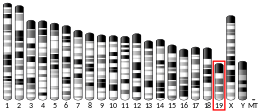Protein-coding gene in humans
Cleavage and polyadenylation specificity factor subunit 7 is a protein that in humans is encoded by the CPSF7 gene .[ 5] [ 6]
Function
CPSF7, also known as CFIm59, is the cleavage factor of two closely associated protein complexes in the 3' untranslated region of a newly synthesized pre-messenger RNA (mRNA) molecule used in gene transcription . [ 7] Cleavage and polyadenylation specificity factors (CPSF), the other two being CFIm25 (or CPSF5/NUDT21 ) and CFIm68 (or CPSF6 ).
References
^ a b c GRCh38: Ensembl release 89: ENSG00000149532 – Ensembl , May 2017^ a b c GRCm38: Ensembl release 89: ENSMUSG00000034820 – Ensembl , May 2017^ "Human PubMed Reference:" . National Center for Biotechnology Information, U.S. National Library of Medicine .^ "Mouse PubMed Reference:" . National Center for Biotechnology Information, U.S. National Library of Medicine .^ Strausberg RL, Feingold EA, Grouse LH, Derge JG, Klausner RD, Collins FS, et al. (December 2002). "Generation and initial analysis of more than 15,000 full-length human and mouse cDNA sequences" . Proceedings of the National Academy of Sciences of the United States of America . 99 (26): 16899– 903. Bibcode :2002PNAS...9916899M . doi :10.1073/pnas.242603899 PMC 139241 PMID 12477932 . ^ "Entrez Gene: FLJ12529 pre-mRNA cleavage factor I, 59 kDa subunit" .^ Hardy JG, Norbury CJ (August 2016). "Cleavage factor Im (CFIm) as a regulator of alternative polyadenylation" . Biochemical Society Transactions . 44 (4): 1051– 7. doi :10.1042/BST20160078 . PMID 27528751 . S2CID 206156045 .
Further reading
Olsen JV, Blagoev B, Gnad F, Macek B, Kumar C, Mortensen P, Mann M (November 2006). "Global, in vivo, and site-specific phosphorylation dynamics in signaling networks" . Cell . 127 (3): 635– 48. doi :10.1016/j.cell.2006.09.026 PMID 17081983 . S2CID 7827573 . Lim J, Hao T, Shaw C, Patel AJ, Szabó G, Rual JF, Fisk CJ, Li N, Smolyar A, Hill DE, Barabási AL, Vidal M, Zoghbi HY (May 2006). "A protein-protein interaction network for human inherited ataxias and disorders of Purkinje cell degeneration" . Cell . 125 (4): 801– 14. doi :10.1016/j.cell.2006.03.032 PMID 16713569 . S2CID 13709685 . Brill LM, Salomon AR, Ficarro SB, Mukherji M, Stettler-Gill M, Peters EC (May 2004). "Robust phosphoproteomic profiling of tyrosine phosphorylation sites from human T cells using immobilized metal affinity chromatography and tandem mass spectrometry". Analytical Chemistry . 76 (10): 2763– 72. doi :10.1021/ac035352d . PMID 15144186 . Rüegsegger U, Beyer K, Keller W (March 1996). "Purification and characterization of human cleavage factor Im involved in the 3' end processing of messenger RNA precursors" . The Journal of Biological Chemistry . 271 (11): 6107– 13. doi :10.1074/jbc.271.11.6107 PMID 8626397 .




